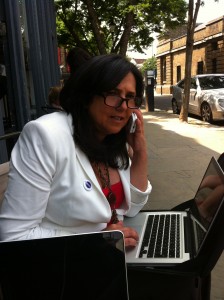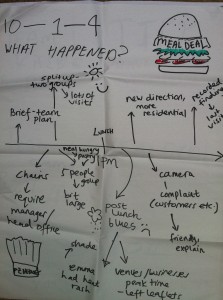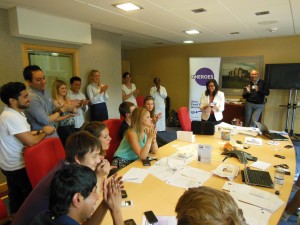I’ve long admired the work of Martin White on Information Governance, Intranets and Search and as Chairman of the Online Conference that used to be a must attend event at Olympia in December. I fondly recall a Hilton Hotel, Heathrow T4 meeting at the end of the 90’s between the two of us and Gerry McGovern in which we hammered out the components of an Intranet checklist. And the horror at finding the parking bill was nearly as expensive as a tank of petrol.
We go back a long way, have worked on a number of assignments together and I once gave the Keynote Speech for Intranet Focus at the inaugural Russian Intranet Forum in Moscow where David Gurteen ran his first Russian Knowledge Cafe.
Martin and I meet regularly. It’s one of the nicer aspects of working in alliance that you get to share ideas (within the bounds of confidentiality) with people you choose rather than those an organisation chooses for you. In the Summer we met a couple of times to review experiences in Legal Knowledge & Information Management. I’d just given the Keynote speech at KM Legal and written a blog post while Martin was in the midst of a new assignment writing a digital workplace strategy for a prominent law firm.
Legal is changing, is KIM ready?
Martin too had noticed changes in the way law firms were working. As we compared notes we became aware that some of the knowledge management, information management and project management approaches that we had been using for many years might be unfamiliar to law firms. We decided to validate our conclusions by talking to some of our contacts in law firms and among the comments we noted were:
- “We are great at capturing, not so great at sharing, especially when it comes to knowledge about clients”
- “Too many people think that writing a project plan is all that is needed to make a success of Legal Project Management”
A couple of hours on 4 key topics
We have decided to set up a meeting at which we could share some of our experience with senior knowledge and information managers working in law firms. Our Breakfast Breakout will take place in the Benjamin Franklin room at the Royal Society of Arts on 9 December. Starting at 9.00am (but with breakfast at 8.30am) we will be covering (amongst other topics)
- Knowledge Loss & Knowledge Gain,
- Legal Project Management,
- Getting the best from firm/client virtual teams
- Stakeholder Engagement and Management
We will be talking about Knowledge Chameleons, the “Balloon on a Phone” and WTGTGQ – When They Go They Go Quickly. There will also be a chance to benchmark your own situation, though the Chatham House Rule will apply throughout the meeting. With just ten working days to Christmas we’ll provide a relaxed setting, no PowerPoint presentations, a good breakfast and an opportunity to support the PlanZheros charity instead of paying for a ticket. You will be able to be back at your desks by 11.00. The room will be set out cabaret-style and we’ll be moving everyone around after the mid-way break to foster networking.
How to register
Registration details will be posted here, on Twitter @pauljcorney and @intranetfocus in the next few weeks.
Donations to a charity
It being Christmas we decided instead of asking attendees to contribute to the cost of the event we’d invite them to make a donation to the Plan Zheroes charity I am a founding Trustee of. So much is happening on that front and the next three months are critical, we need all the help we can get to launch our new web/mobile presence.






